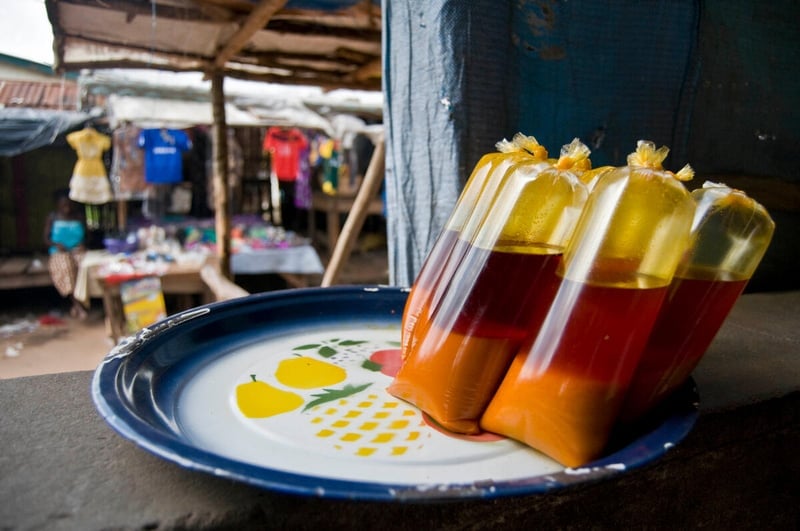November 26, 2025 | 17:07 GMT +7
November 26, 2025 | 17:07 GMT +7
Hotline: 0913.378.918
November 26, 2025 | 17:07 GMT +7
Hotline: 0913.378.918

Palm oil for sale at a market in Moyamba, Sierra Leone. Photo: FAO/Caroline Thomas.
The FAO Food Price Index, a benchmark for world food commodity prices, averaged 130.1 points in July 2025, up 1.6 percent from June, driven primarily by rising international prices of meat and vegetable oils. Despite this monthly increase, the index remains 18.8 percent below its peak in March 2022, although 7.6 percent higher than its level in July 2024.
The index tracks monthly changes in the international prices of a set of globally traded food commodities. In July, price increases in the meat and vegetable oil indices more than offset declines in the cereal, dairy and sugar indices.
The FAO Cereal Price Index averaged 106.5 points, down 0.8 percent from June. Declining wheat and sorghum prices outweighed increases in maize and barley. Fresh seasonal wheat harvests in the northern hemisphere put downward pressure, though adverse conditions of spring wheat in parts of northern America provided some price support. The FAO All Rice Price Index dropped 1.8 percent, driven by ample export supplies and weak import demand.
The FAO Vegetable Oil Price Index averaged 166.8 points in July, marking a sharp rise of 7.1 percent from the previous month, reaching a three-year high. The increase reflected higher quotations for palm, soy and sunflower oils. Palm oil prices rose on robust global demand and improved competitiveness, while soy oil was supported by expectations of firm biofuel sector demand in the Americas. Sunflower oil prices also climbed due to tightening export supplies in the Black Sea region. In contrast, rapeseed oil prices declined with the arrival of new crop supplies in Europe.
The FAO Meat Price Index averaged 127.3 points, up 1.2 percent from June, reaching a new all-time high. The increase was led by higher prices for bovine and ovine meat, supported by strong import demand, particularly from China and the United States of America. Poultry meat prices also edged up slightly amid resumed imports from key partners following Brazil’s regaining of its avian influenza-free status. Conversely, pig meat prices declined due to ample supplies and reduced global demand, especially in the European Union.
The FAO Dairy Price Index edged down by 0.1 percent from June to 155.3 points, marking the first decline since April 2024. Prices for butter and milk powders decreased, reflecting abundant export supplies and subdued import demand, particularly from Asia. However, international cheese prices continued to rise, driven by strong demand in Asian and Near East markets and tighter export availability in the European Union.
The FAO Sugar Price Index averaged 103.3 points, down 0.2 percent from the previous month, continuing its downward trend for a fifth consecutive month. Expectations of a global production recovery in 2025/26, notably in Brazil, India, and Thailand, weighed on prices, although signs of a rebound in global sugar import moderated the decline.
(FAO)
/2025/11/24/3616-2-141832_513.jpg)
(VAN) FSC certification has helped increase the value of thousands of hectares of planted forest timber under the management of the Xuan Loc Protection Forest Management Board, particularly in terms of selling prices.

(VAN) More than 100 shoppers queued for a chance to get a kilo or so of Japanese rice for 500 yen ($3.32) by heaping as much grain into a small wooden box as possible.

(VAN) Benchmark international prices of milled declined in October as harvests started or improved in some parts of the globe.

(VAN) Show cause orders will be issued to retailers who sell imported rice at prices exceeding the maximum suggested retail price (MSRP) of P43 per kilo, Philippines Agriculture Secretary said in a statement on Thursday.

(VAN) Coffee prices on October 20, 2025, remained stable domestically, trading at 113,500–114,500 VND/kg. Similarly, global coffee prices also moved sideways.

(VAN) By October, Vietnam’s coffee exports had surpassed USD 7 billion for the first time and will exceed USD 8 billion within this year.

(VAN) Illinois rancher says Texas, Oklahoma, Kansas lost grass and forage, forcing massive cattle liquidation.